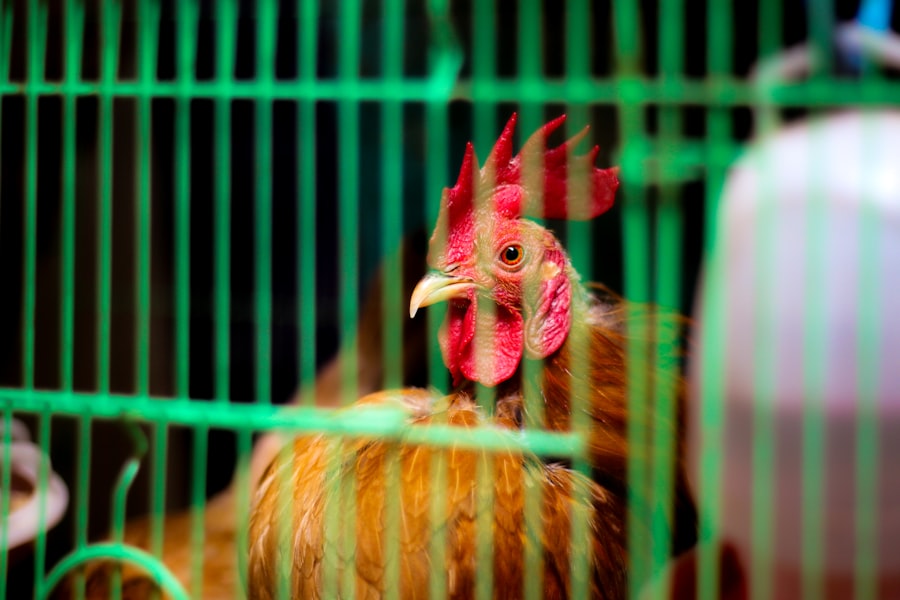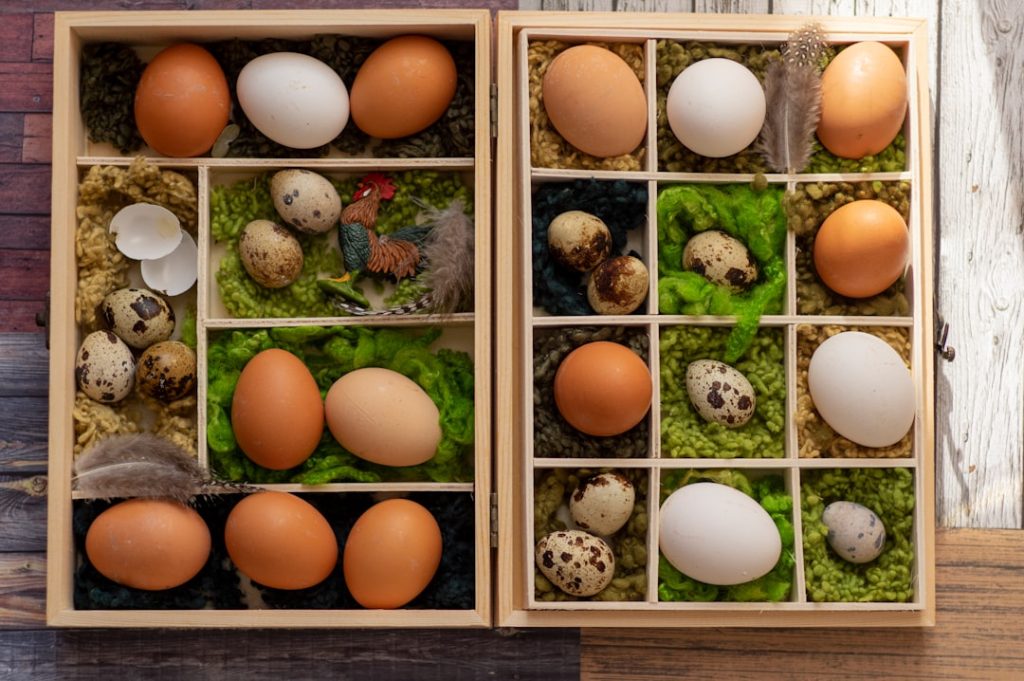When it comes to raising chickens, choosing the right breed is crucial. There are many different breeds to choose from, each with its own unique characteristics and requirements. Some popular breeds for egg production include the Rhode Island Red, Leghorn, and Plymouth Rock.
These breeds are known for their high egg production and are a great choice for those looking to raise chickens for their eggs. If you are more interested in raising chickens for meat, then breeds such as the Cornish Cross or the Freedom Ranger are good options. These breeds are known for their fast growth and high meat yield.
Additionally, if you are looking for a dual-purpose breed that can provide both eggs and meat, then breeds like the Sussex or Orpington are great choices. It’s important to consider your specific needs and goals when choosing a breed, as well as the climate and environment in which you will be raising the chickens. For those seeking friendly and docile breeds, the Silkie or the Buff Orpington are excellent options.
These breeds are known for their gentle nature and make great pets for families with children. If you require a breed that is cold-hardy and can withstand harsh winters, the Wyandotte or the Australorp are suitable choices. These breeds have thick, insulating feathers and are well-suited for colder climates.
It is essential to conduct thorough research on different breeds and their specific characteristics before making a decision. Consider factors such as egg production, meat yield, temperament, and climate adaptability to ensure that you choose the right breed for your needs.
Table of Contents
Key Takeaways
- Consider the climate, space, and purpose of raising chickens when choosing the right breed for your coop
- When building a coop, prioritize safety, ventilation, and easy access for cleaning and egg collection
- Provide a balanced diet of grains, greens, and protein, and ensure access to clean water at all times
- Keep chickens entertained with perches, dust baths, and toys to reduce stress and encourage natural behaviors
- Regularly check for signs of illness, provide proper vaccinations, and secure the coop against predators for the health and safety of your chickens
- Collect eggs daily, store them in a cool, dry place, and clean them before use
- Regularly clean the coop, remove waste, and maintain proper ventilation to ensure a healthy environment for your chickens
Building a Coop
Size and Space
The size of the coop will depend on the number of chickens you plan to raise. A good rule of thumb is to provide at least 2-3 square feet of space per chicken inside the coop. This will give them enough room to move around comfortably and reduce stress.
Ventilation and Air Quality
Good ventilation is essential in a chicken coop to remove ammonia and moisture from the air. This can be achieved through windows, vents, or a combination of both. Fresh air and good ventilation will help keep your chickens healthy and reduce the risk of respiratory problems.
Predator Protection and Security
Chickens are vulnerable to predators such as foxes, raccoons, and birds of prey, so it’s essential to make sure the coop is secure and predator-proof. This can be achieved by using sturdy materials such as hardware cloth or welded wire for the walls and windows, as well as adding locks to the doors and windows. Additionally, consider the location of the coop, placing it in an area that is well-drained and free from standing water, and easily accessible for cleaning and maintenance.
By taking these factors into consideration when building a coop, you can create a safe and comfortable environment for your chickens to thrive.
Feeding and Watering
Feeding and watering your chickens is an essential part of raising them. A balanced diet is crucial for their health and productivity, so it’s important to provide them with high-quality feed that meets their nutritional needs. When it comes to feeding chickens, there are several options to consider.
You can choose to feed them commercial chicken feed, which is formulated to provide all the essential nutrients they need. This can be purchased in pellet, crumble, or mash form, depending on your preference. Additionally, you can supplement their diet with kitchen scraps, fruits, vegetables, and grains to provide them with additional nutrients and variety.
In addition to feeding, providing clean and fresh water is also crucial for your chickens’ health. Chickens need access to clean water at all times to stay hydrated and maintain their overall health. It’s important to regularly check their water supply and clean their waterers to prevent the growth of bacteria and algae.
Additionally, during hot weather, it’s important to provide shade and cool water to help prevent heat stress in your chickens. By paying attention to their feeding and watering needs, you can ensure that your chickens stay healthy and productive.
Providing Entertainment
Chickens are curious and active animals that benefit from mental stimulation and entertainment. Providing them with entertainment not only keeps them happy and healthy but also prevents boredom-related behaviors such as feather picking or aggression. There are several ways to provide entertainment for your chickens.
One option is to provide them with a dust bath area where they can roll around in dry dirt or sand to keep their feathers clean and free from parasites. This also provides them with a natural behavior that they enjoy. Another way to provide entertainment for your chickens is by hanging treats or vegetables from a string or rope inside the coop or run.
This encourages them to peck at the treats, providing mental stimulation and physical activity. Additionally, providing them with perches or roosts inside the coop gives them a place to rest and observe their surroundings. Chickens also enjoy scratching and pecking at the ground, so providing them with access to an outdoor area where they can forage for insects and plants is beneficial for their mental and physical well-being.
Furthermore, providing them with toys such as hanging mirrors or shiny objects can also provide entertainment and enrichment for your chickens. By providing them with various forms of entertainment, you can ensure that your chickens lead happy and fulfilling lives.
Health and Safety
Ensuring the health and safety of your chickens is crucial for their well-being. There are several factors to consider when it comes to keeping your chickens healthy and safe. One important aspect is biosecurity measures to prevent the spread of diseases.
This includes quarantining new birds before introducing them to your existing flock, as well as regularly cleaning and disinfecting their living quarters. Additionally, it’s important to monitor your chickens for signs of illness or injury and seek veterinary care when necessary. Common signs of illness in chickens include lethargy, decreased appetite, abnormal droppings, respiratory issues, or changes in behavior.
It’s important to address any health concerns promptly to prevent the spread of illness within the flock. Furthermore, providing a safe environment for your chickens is crucial for their safety. This includes predator-proofing their coop and run, as well as providing them with a secure place to roost at night.
It’s also important to regularly inspect their living quarters for any potential hazards such as sharp objects or toxic plants. By taking these measures to ensure the health and safety of your chickens, you can help them lead long and healthy lives.
Egg Collection and Storage

Collecting Eggs Daily
Once your chickens start laying eggs, it’s essential to establish a routine for collecting them daily. This prevents eggs from getting dirty or cracked. Handle eggs gently when collecting them to prevent damage to the shells.
Proper Storage for Freshness
After collecting the eggs, it’s crucial to store them properly to maintain their freshness and quality. Store eggs in a cool place with consistent temperature and humidity levels, such as a refrigerator or cool cellar. Store eggs with the pointed end down to help maintain their quality.
Regular Inspection for Spoilage
Regularly inspect the eggs for any signs of spoilage or contamination. Check for cracks or leaks in the shells, and discard any eggs that have an off odor or unusual appearance. By establishing a routine for collecting and storing eggs properly, you can ensure a fresh and high-quality supply of eggs for consumption.
Cleaning and Maintenance
Regular cleaning and maintenance of your chicken coop is essential for the health and well-being of your flock. It’s important to establish a cleaning routine that includes removing soiled bedding, cleaning feeders and waterers, and disinfecting the living quarters. When cleaning the coop, it’s important to use safe cleaning products that are non-toxic to chickens.
This includes using natural cleaners such as vinegar or hydrogen peroxide to disinfect surfaces without harming your chickens. Additionally, it’s important to regularly inspect the coop for any signs of wear or damage that may need repair. This includes checking for loose wires or nails, as well as repairing any holes or gaps that may compromise the security of the coop.
By establishing a regular cleaning and maintenance routine, you can ensure that your chickens have a clean and safe living environment that promotes their health and well-being. In conclusion, raising chickens can be a rewarding experience when done properly. By choosing the right breed, building a suitable coop, providing proper feeding and watering, offering entertainment and enrichment, ensuring health and safety measures are in place, collecting and storing eggs correctly, as well as maintaining cleanliness in their living quarters – you can create an environment where your chickens can thrive and provide you with fresh eggs or meat while enjoying their company.
If you’re looking for more ideas on how to keep your chickens happy and healthy, check out this article on chicken coop interior ideas. It offers great tips on creating a comfortable and functional living space for your feathered friends.
FAQs
What are the benefits of keeping chickens?
Keeping chickens can provide a sustainable source of fresh eggs, natural pest control for your garden, and a source of organic fertilizer for your plants.
What do chickens need to thrive?
Chickens need a secure and spacious coop, access to fresh water, a balanced diet of chicken feed and kitchen scraps, and regular health check-ups to thrive.
How much space do chickens need?
Chickens need at least 2-3 square feet of space inside the coop and 8-10 square feet of outdoor space per chicken to roam and forage.
What are some common health issues for chickens?
Common health issues for chickens include mites, lice, respiratory infections, and egg-laying problems. Regular health check-ups and proper hygiene can help prevent these issues.
What are some easy chicken breeds for beginners?
Some easy chicken breeds for beginners include Rhode Island Reds, Plymouth Rocks, and Sussex. These breeds are known for their hardiness and good egg production.
How can I protect my chickens from predators?
To protect your chickens from predators, make sure the coop is secure with strong fencing, lock the coop at night, and consider using motion-activated lights or alarms to deter predators.
Meet Walter, the feathered-friend fanatic of Florida! Nestled in the sunshine state, Walter struts through life with his feathered companions, clucking his way to happiness. With a coop that’s fancier than a five-star hotel, he’s the Don Juan of the chicken world. When he’s not teaching his hens to do the cha-cha, you’ll find him in a heated debate with his prized rooster, Sir Clucks-a-Lot. Walter’s poultry passion is no yolk; he’s the sunny-side-up guy you never knew you needed in your flock of friends!







